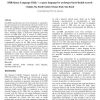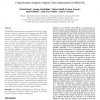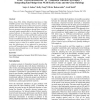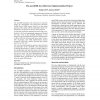MEDINFO
2007
14 years 1 months ago
2007
OpenEHR specifications have been developed to standardise the representation of an international electronic health record (EHR). The language used for querying EHR data is not as ...
MEDINFO
2007
14 years 1 months ago
2007
Terminologies are increasingly based on “ontologies” developed in description logics and related languages such as the new Web Ontology Language, OWL. The use of description l...
MEDINFO
2007
14 years 1 months ago
2007
The accurate quantification of disease patterns in medical images allows radiologists to track the progress of a disease. Various computer vision techniques are able to automatica...
MEDINFO
2007
14 years 1 months ago
2007
This paper presents an idealized conceptual framework for consumer health informatics research drawing from complementary disciplines: information science and health campaign rese...
MEDINFO
2007
14 years 1 months ago
2007
In this paper we present the ongoing development and extension work on BioTop – a top-domain ontology for linking biomedical domain ontologies. We start by making the case for t...
MEDINFO
2007
14 years 1 months ago
2007
In this paper we describe a model of clinical information designed to make health information systems properly interoperable and safely computable. The model is a response to a nu...
MEDINFO
2007
14 years 1 months ago
2007
PROBLEM: Automatic keyword assignment has been largely studied in medical informatics in the context of the MEDLINE database, both for helping search in MEDLINE and in order to pr...
MEDINFO
2007
14 years 1 months ago
2007
Entrez Gene (EG), Online Mendelian Inheritance in Man (OMIM) and the Gene Ontology (GO) are three complementary knowledge resources that can be used to correlate genomic data with...
MEDINFO
2007
14 years 1 months ago
2007
The openEHR foundation has developed an innovative design for interoperable and future-proof Electronic Health Record (EHR) systems based on a dual model approach with a stable re...
MEDINFO
2007
14 years 1 months ago
2007
Matching clinical data to codes in controlled terminologies is the first step towards achieving standardisation of data for safe and accurate data interoperability. The MoST autom...




